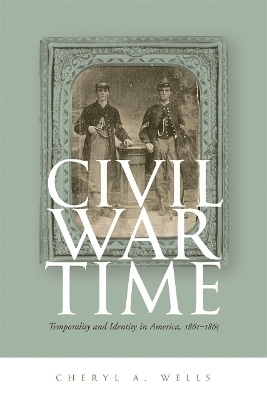
Civil War Time
Temporality and Identity in America, 1861-1865
Seiten
2012
University of Georgia Press (Verlag)
978-0-8203-4342-6 (ISBN)
University of Georgia Press (Verlag)
978-0-8203-4342-6 (ISBN)
- Lieferbar (Termin unbekannt)
- Portofrei ab CHF 40
- Auch auf Rechnung
- Artikel merken
In antebellum America, both North and South emerged as modernising, capitalist societies. Work bells, clock towers, and personal timepieces increasingly instilled discipline on one’s day, which already was ordered by religious custom and nature’s rhythms. The Civil War changed that, argues Cheryl A. Wells. Overriding antebellum schedules, war played havoc with people’s perception and use of time. For those closest to the fighting, the war’s effect on time included disrupted patterns of sleep, extended hours of work, conflated hours of leisure, indefinite prison sentences, challenges to the gender order, and desecration of the Sabbath.
Wells calls this phenomenon “battle time.” To create a modern war machine military officers tried to graft the antebellum authority of the clock onto the actual and mental terrain of the Civil War. However, as Wells’s coverage of the Manassas and Gettysburg battles shows, military engagements followed their own logic, often without regard for the discipline imposed by clocks. Wells also looks at how battle time’s effects spilled over into periods of inaction, and she covers not only the experiences of soldiers but also those of nurses, prisoners of war, slaves, and civilians.
After the war, women returned, essentially, to an antebellum temporal world, says Wells. Elsewhere, however, postwar temporalities were complicated as freedmen and planters, and workers and industrialists renegotiated terms of labour within parameters set by the clock and nature. A crucial juncture on America’s path to an ordered relationship to time, the Civil War had an acute effect on the nation’s progress toward a modernity marked by multiple, interpenetrating times largely based on the clock.
Wells calls this phenomenon “battle time.” To create a modern war machine military officers tried to graft the antebellum authority of the clock onto the actual and mental terrain of the Civil War. However, as Wells’s coverage of the Manassas and Gettysburg battles shows, military engagements followed their own logic, often without regard for the discipline imposed by clocks. Wells also looks at how battle time’s effects spilled over into periods of inaction, and she covers not only the experiences of soldiers but also those of nurses, prisoners of war, slaves, and civilians.
After the war, women returned, essentially, to an antebellum temporal world, says Wells. Elsewhere, however, postwar temporalities were complicated as freedmen and planters, and workers and industrialists renegotiated terms of labour within parameters set by the clock and nature. A crucial juncture on America’s path to an ordered relationship to time, the Civil War had an acute effect on the nation’s progress toward a modernity marked by multiple, interpenetrating times largely based on the clock.
CHERYL A. WELLS is an assistant professor of history at the University of Wyoming.
| Erscheint lt. Verlag | 1.6.2012 |
|---|---|
| Verlagsort | Georgia |
| Sprache | englisch |
| Gewicht | 280 g |
| Themenwelt | Geschichte ► Allgemeine Geschichte ► Neuzeit (bis 1918) |
| Geisteswissenschaften ► Geschichte ► Regional- / Ländergeschichte | |
| Geschichte ► Teilgebiete der Geschichte ► Militärgeschichte | |
| Naturwissenschaften ► Biologie ► Ökologie / Naturschutz | |
| Naturwissenschaften ► Geowissenschaften ► Geografie / Kartografie | |
| Sozialwissenschaften ► Soziologie | |
| ISBN-10 | 0-8203-4342-0 / 0820343420 |
| ISBN-13 | 978-0-8203-4342-6 / 9780820343426 |
| Zustand | Neuware |
| Haben Sie eine Frage zum Produkt? |
Mehr entdecken
aus dem Bereich
aus dem Bereich
Europa 1848/49 und der Kampf für eine neue Welt
Buch | Hardcover (2023)
DVA (Verlag)
CHF 67,20
Giordano Bruno - ein ketzerisches Leben
Buch | Hardcover (2024)
C.H.Beck (Verlag)
CHF 41,85


